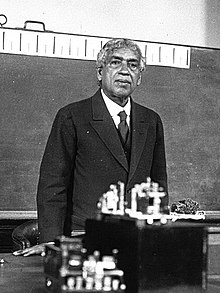J. C. Bose
Sir Jagadish Chandra Bose,CSI,CIE,FRS (/boʊs/;Bengali: [dʒɔgod̪iʃ tʃɔnd̪ro bosu]; 30 November 1858 – 23 November 1937), also spelled Jagdish and Jagadis, was a Bengali polymath, physicist, biologist, biophysicist, botanist and archaeologist, and an early writer of science fiction. Living in British India, he pioneered the investigation of radio and microwave optics, made significant contributions to plant science, and laid the foundations of experimental science in the Indian subcontinent.IEEE named him one of the fathers of radio science. Bose is considered the father of Bengali science fiction, and also invented the crescograph, a device for measuring the growth of plants. A crater on the moon has been named in his honour.
Born in Munshiganj, Bengal Presidency during the British Raj (present-day Bangladesh), Bose graduated from St. Xavier's College, Calcutta. He went to the University of London to study medicine, but could not pursue studies in medicine because of health problems. Instead, he conducted his research with the Nobel Laureate Lord Rayleigh at Cambridge and returned to India. He joined the Presidency College of the University of Calcutta as a professor of physics. There, despite racial discrimination and a lack of funding and equipment, Bose carried on his scientific research. He made remarkable progress in his research of remote wireless signalling and was the first to use semiconductor junctions to detect radio signals. However, instead of trying to gain commercial benefit from this invention, Bose made his inventions public in order to allow others to further develop his research.
...
Wikipedia

